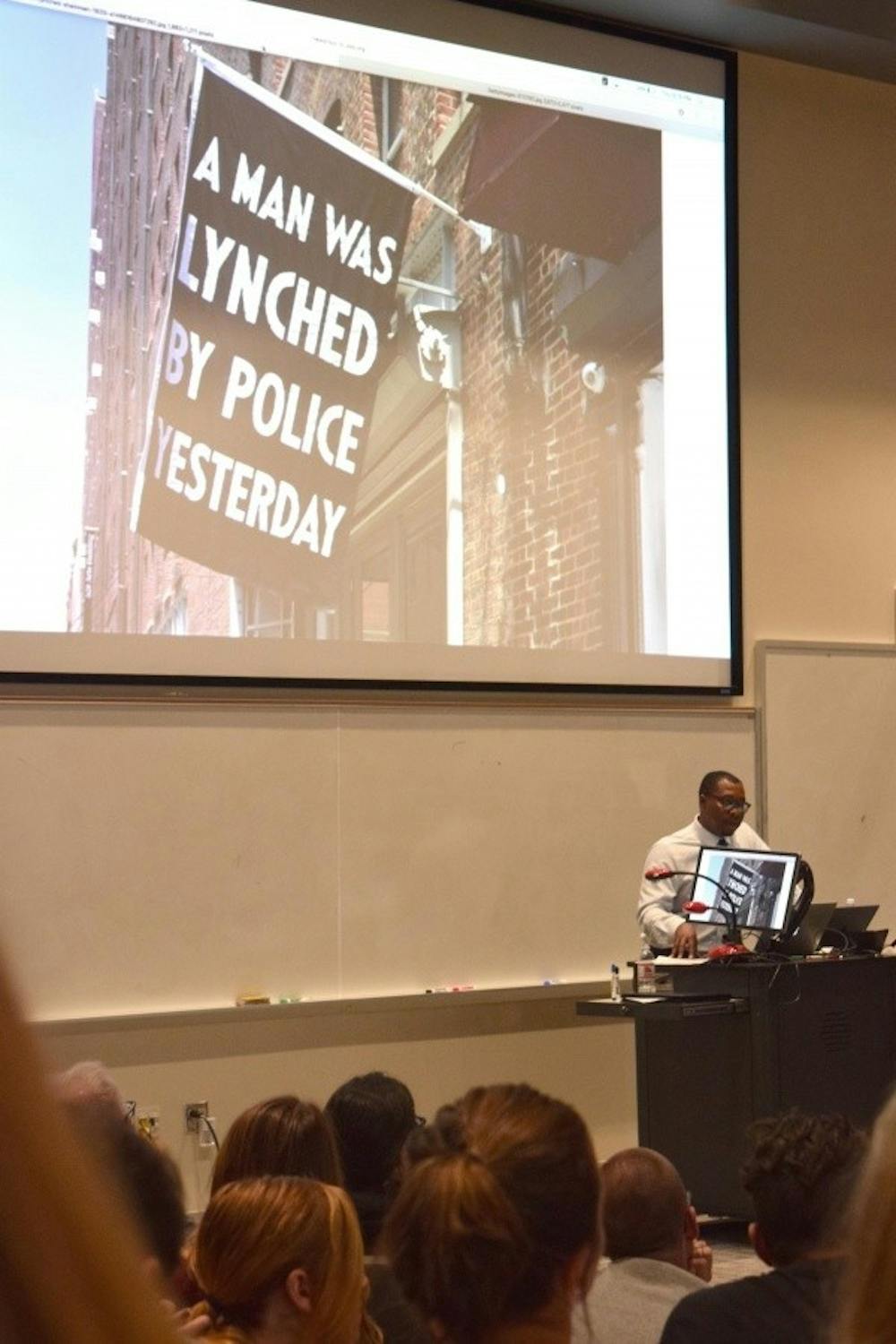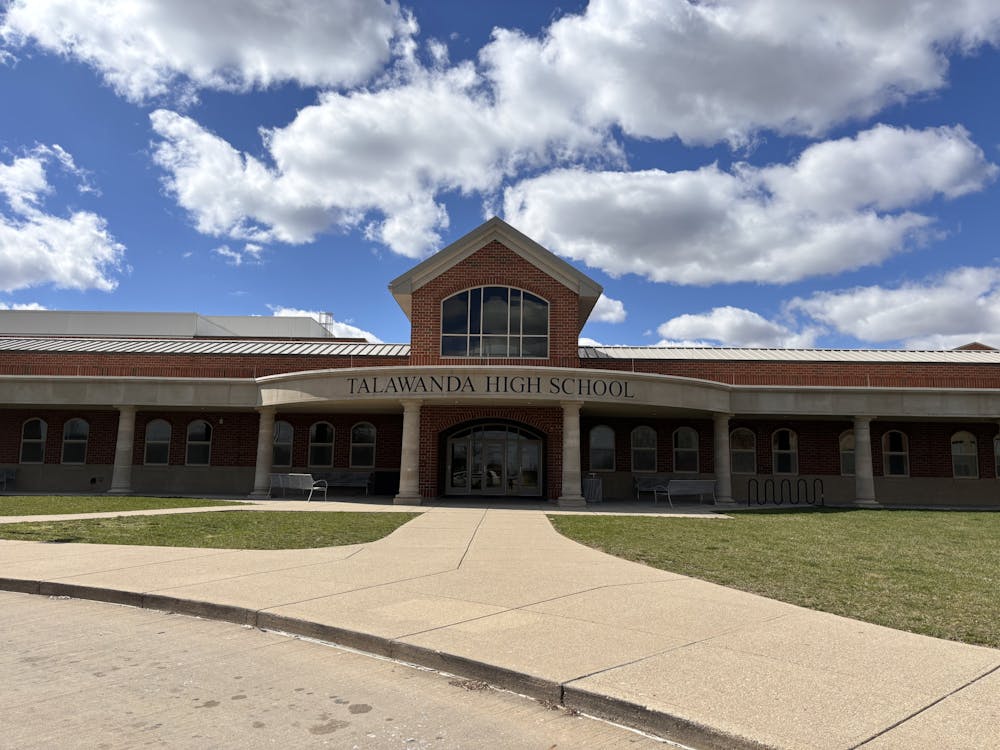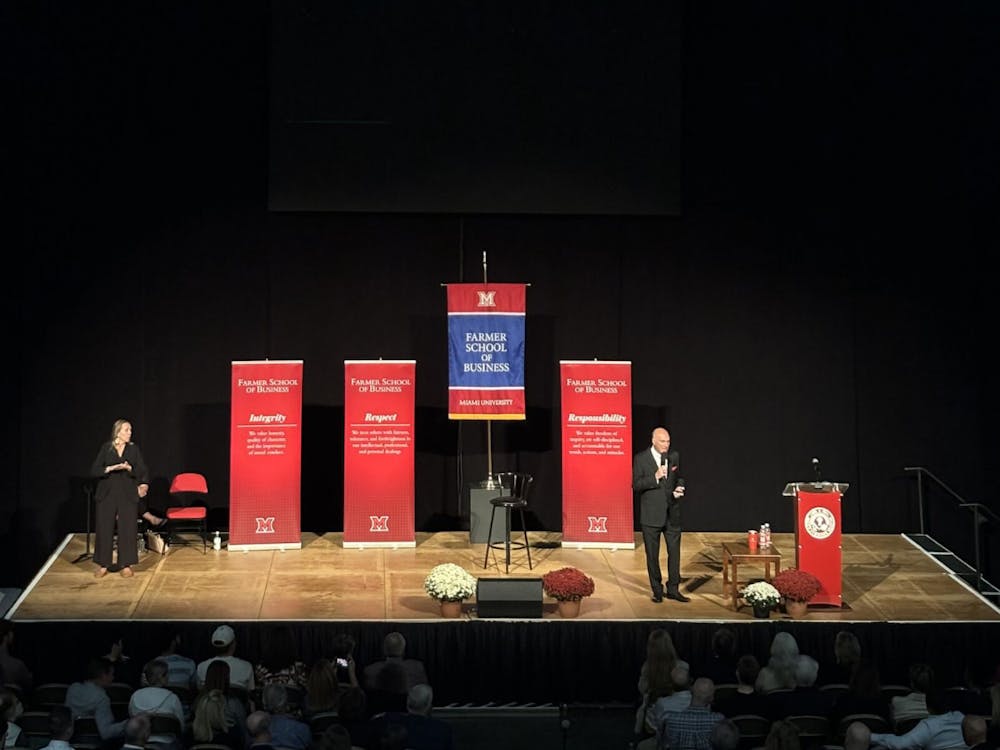Local police focus on community
By Samantha Brunn, The Miami Student
On Thurs. Sept. 29, Miami hosted Dr. Karlos Hill, assistant professor of African and African American studies at the University of Oklahoma.
Hill gave his lecture, "21st Century Lynchings? Meditations on Police Shootings of Unarmed Black People," in reference to his recent book, Beyond the Rope: The Impact of Lynching on Black Culture and Memory, published by Cambridge University Press in May 2016.
In light of recent events concerning police shootings of unarmed black people, Hill's lecture brought context of the the current struggle across America to those who were in attendance.
"Given the frequency, as well as oftentimes the callousness in which these killings occur, black activists, namely the Black Lives Matter movement, as well as black people in general, have begun to refer to them as modern-day lynchings," Hill said.
This context is the foundation for the title and content of Hill's lecture.
While Hill made it clear that lynchings in the traditional sense are not at all the same as today's issue of police shootings of unarmed black people, he also claimed these situations have far more similarities than differences.
"Framing police killings of unarmed blacks as lynchings, I would argue, is decidedly an attempt to draw attention to this phenomenon," Hill said. "It is an attempt to imbue them with historical significance."
As Hill addressed the social context for how the comparison came about, he posed the question of what the implications are of referring to these events in this way.
"I do not think that the police shootings of unarmed black people are lynchings, at least not in the technical sense," Hill said. "The most important part of this discussion, though, is what does this association reveal about what's happening today?... When we dismiss the comparison, we dismiss the emotive context for how it came to be."
According to John McCandless, Chief of Police for the MUPD, the current situation is not conducive to the future of policing in America.
Enjoy what you're reading?
Signup for our newsletter
"I'm hoping, as far as race relations, that we can all do better at listening and trying to pay better attention to what the other one is saying," McCandless said. "We certainly can't continue the way we are going. That's kind of a simple fact there."
From a local standpoint, McCandless said the MUPD has a strong relationship with the community, and wants to continue to encourage emphasis on connecting with the community.
"We really encourage our students to do ride alongs, we have officers embedded in student groups on campus. I think the more we can get to know each other, before there is ever a problem, it will help us down the road," McCandless said.
John Jones, Chief of Police for the OPD, also said the OPD has a strong relationship with the Oxford community.
"We can't police efficiently without partnering with the public. The public's trust and confidence in the police is very important for us to do our job," Jones said. "Community engagement is important. We're doing a lot of things just to try and reach out and say 'This is the community we police; tell us what we are doing right and wrong, what you would like to see done differently,' to get some feedback."
However, Jones feels the community could do their part to continue the conversation.
"We try so hard to reach out, and often aren't always met in the middle. That's really up to the community," Jones said.
Hill said community outreach and better police training are not enough, however, to solve the issues plaguing America's attitude toward policing.
"When protocols are breached, at the very least, a reprimand should be had. And oftentimes, it is not," Hill said. "The only way this problem changes for the better, is police officers who clearly violate protocol are held accountable for using deadly force against non-threatening, unarmed blacks."
Jones said the issue of accountability for police is definitely up for debate, and saying police accountability is an issue is a fair statement to make.
"Transparency is important, especially when it comes to discipline in general. We are trying to build in methods for self-policing, but if it ever came to it, we would rely on an outside investigation for any major issues," Jones said.
Hill said the controversy surrounding body camera footage stems from the precedent of police departments concealing evidence from the public.
McCandless agreed with the concept of outside review.
"I think the best way, when you have these shootings, is that there needs to be an independent person looking into it," McCandless said. "In terms of releasing of body cam videos, I'm not sure that should be left to the police department. I think if there is another entity who has to prosecute it or deny the prosecution, releasing the footage prematurely can cause problems. But there needs to be a collective voice saying when the right time to release it is," McCandless said.
However, many police departments around the country cannot claim to be as connected to their communities or as open to reform as the local departments here in Oxford.
Hill said the heart of the nationwide emotional response to police shootings of unarmed black people is the same emotional response that gripped the black community during the lynching era.
"Because of the emotional association between police shootings of unarmed blacks and lynchings, the issue refuses to die. In part because the wounds the black community has experienced continue to remain open and unhealed," Hill said.
Xavia Hawkins, a sophomore transfer student to Miami, appreciated the reality presented by Hill's lecture.
"The fact that it truly gave people perspective on what's been going on in our country, that's what I appreciated the most. It definitely wasn't sugar-coated. That's been an absolute problem in the past... sometimes the media only shows the violent crime of protesters and chooses not to show the people who are going around helping the police officers, giving them water and things like that," Hawkins said.
Hawkins said she feels society could be talking about the various aspects of this issue more in order to truly come to a comprehensive solution, and be tolerant of others even if there is disagreement.
"I actually designed the poster for the Black Lives Matter vigil tomorrow, and we found it slashed today. Someone took a knife to it. And someone else removed one of our posters. It just goes to show that by us trying to use our voices, it hasn't solved the problem," Hawkins said.
Hill's lecture served as a reminder to the Miami community that work still remains to be done on truly bridging the divide when it comes to race relations in America.




